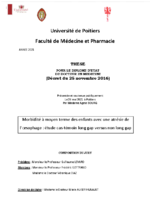Thèse d'exercice
Bourg Agate
Morbidité à moyen terme des enfants avec une atrésie de l'œsophage : étude cas-témoin long gap versus non long gap
FrançaisConsulter le texte intégral (format PDF)

Résumé
Français
Morbidité à moyen terme des enfants avec une atrésie de l'œsophage : étude cas-témoin long gap versus non long gap
- Atrésie de l'oesophage
- Complications (médecine)
- Comorbidité -- Chez l'enfant
English
Introduction: Esophageal atresia (EA) is a rare congenital malformation. The initial surgery depends on the length of the gap. Nowadays, the survival rate of operated children is high but medium and long-term morbidity is still important. The aim of this study was to compare morbidity at 6 years between long gap esophageal atresia (LGEA) and non-long gap esophageal atresia (NLGEA).
Materials and Methods: We performed a multicentric retrospective study of patients with EA between 2008 and 2010 with a follow-up until the age of 6. For each LGEA, 2 NLGEA were included. The digestive, respiratory and orthopedic morbidity at 6 years were collected from all the medical records in association with CRACMO (Centre de Référence des Affections Chroniques et Malformatives de l'Oesophage).
Results: Thirty-one patients with LGEA and sixty-two with NLGEA were included. There were more esophagitis cases in LGEA group than in NLGEA one (45% vs 15%, p=0.005). More anti-reflux surgeries were performed in LGEA group (65% for LGEA vs 19% for NLGEA, p<0.001). LGEA group had more digestive symptoms like bolus impaction in the esophagus or dysphagia (68% vs 33%, p=0.003) and more complications such as anastomotic stricture (71% vs 38%, p=0.006). There was no significant difference between the two groups regarding respiratory symptoms. NLGEA group had more tracheomalacia than LGEA group (33% vs 6,6%, p=0.006). NLGEA group had more spine deformation than LGEA group (23% vs 3,2%, p=0.026).
Discussion: The 6-year morbidity was higher for LGEA group especially the digestive comorbidity. In the long-term, the follow-ups should be scrutinized closer for these children.
Keywords : esophageal atresia, long-gap esophageal atresia, complications, midterm outcome.
Notice
- Diplôme :
- Diplôme d'état de médecine
- Établissement de soutenance :
- Université de Poitiers
- UFR, institut ou école :
- Domaine de recherche :
- Médecine. Chirurgie pédiatrique
- Directeur(s) du travail :
- Marie Auger Hunault
- Date de soutenance :
- 28 mai 2021
- Président du jury :
- Guillaume Levard
- Membres du jury :
- Frédéric Gottrand, Véronique Diaz
Menu :
-
-
à propos d'UPétille
-
Voir aussi
Annexe :

-
Une question ?
Avec le service Ubib.fr, posez votre question par chat à un bibliothécaire dans la fenêtre ci-dessous ou par messagerie électronique 7j/7 - 24h/24h, une réponse vous sera adressée sous 48h.
Accédez au formulaire...
Université de Poitiers - 15, rue de l'Hôtel Dieu - 86034 POITIERS Cedex - France - Tél : (33) (0)5 49 45 30 00 - Fax : (33) (0)5 49 45 30 50
petille@support.univ-poitiers.fr -
Crédits et mentions légales
